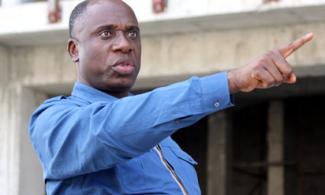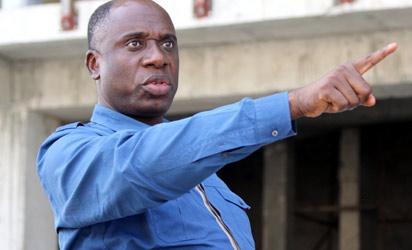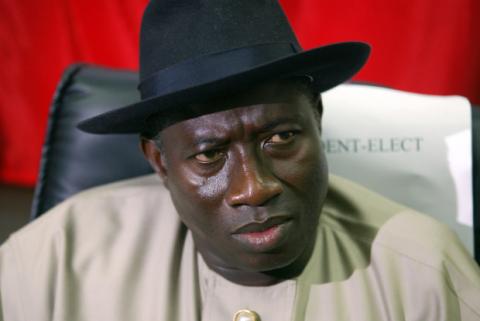
The Presidency further said, "Amaechi should stop trying to make President Jonathan the scapegoat for his woeful performance in Rivers State and look to his own very apparent failings and incompetencies. He should also stop blackmailing the First Lady who has demanded nothing from him other than good governance, justice, equity, fairness, real development and progress in Rivers State.”
The political communication in Nigerian media last week was really troubling because the contents were basically combative, violent-orientated and devoid of issue-based discussion that would have direct bearing on the unity and healthy political life of this country.
The ongoing political narratives and bantering between and among the political bigwigs in the country is so worrisome, especially as the country is heading towards general elections in first quarter of 2015.
With deluge of threats to Nigeria’s corporate existence as a country and other underlying challenges associated with ethno-religious crises and of course the lingering, itching clog of insurgency, the power tussle between North and South vis-à-vis mundane PDP- APC political squabbles and many more are bearing more of a combative look than a political communication.
What even is political communication? Political communication like Pipa Norris of Kennedy School of Government (KSG) in Harvard University argues is an interactive process concerning the transmission of information among politicians, the news media and the public. The process operates down-wards from governing institutions towards citizens, horizontally in linkages among political actors, and also upwards from public opinion towards authorities.
In essence, political communication also has to do with how media report power struggle, their biases and impartial coverage in ensuring sound political process. But the most crucial aspect of it is the analysis of speeches by politicians and those that are trying to influence the political opinion through formal and informal conversations among members of the public.
In our context here in Nigeria, political opinion is influenced through both formal and informal ways. Political actors use the mass media to display their political shenanigans and up the ante of political rivalry between one another which the public are at the receiving end.
The forgoing can be aptly captured by the recent assertions of the Rivers State Governor, Rotimi Amaechi who on 25th October, 2014 while addressing students alleged that First Lady, Mrs. Patience Jonathan’s feud with him revolves around her desire to corruptly share Rivers State resources.

Hear Amaechi’s story to Rivers students: “The quarrel between me and the wife of the President is because she said I should bring your money, Rivers people's money and share with her. I had to abuse the federal government and they abused me back before they could do the work you now see on that road.”
He also hit at his old ally and now arch rival, Barrister Nyesom Wike, saying, “What kind of vision is that for a thief? They have been thieves for too long so it cannot be new vision. The only thing that is new is that he has industrialized stealing.”
At a rally to celebrate the seventh anniversary of his Supreme Court victory at the Amesiemaka Stadium in Ikwerre local government area of the state, Amaechi also said “When Ebola broke out, to show you how much the President hates us, he visited Lagos. Did he visit us? He did not care. He wanted all of us to die. And I took it as a challenge and say none of us will die. I brought out money. It took the President at the end of Ebola to give us ordinary 200 million naira. I released one billion, one hundred and six million naira to fight Ebola. See our airport. The President lands there. We are like refugees…We were to give Port Harcourt water. As I am talking to you, the Minister of Finance has refused to move the file back to the executive council for approval so that you can have water. They don’t care for you. Punish PDP with your vote,” he said.
He went further to say that that ‘thief’ will not be governor of Rivers, literally referring to Wike, “One of them campaigning for governorship was the contractor to do the road. He abandoned the road and took N3 billion and left. Now he wants to become governor, a thief will not be our governor. I challenge them to integrity test, any of them, from Abuja to Rivers State, I challenge them to integrity test. I have worked with them. I have their records; they are in the office of the governor. I challenge them to go ahead. The problem we have is that EFCC is no longer working. Corruption is at its industrial scale. Thieves are thieves; we now have an industry called corruption.”
The Presidency, in its response on 26th October, 2014 challenged Amaechi to stop what they called ‘political rascality’, saying, “Governor Rotimi Amaechi took his obnoxious willingness to denigrate the highest office in the land in a reckless bid to advance his selfish political interests to a new level of irresponsible and rascally behavior with his totally false and baseless vituperations against President Jonathan, the First Lady and the Federal Government.”

The Presidency insisted that the governor had totally lost all sense of propriety, decorum and responsible political behavior and resorted to unacceptable demagoguery, libel, blackmail and incitement of public disorder.
It further warned him that there are legal, constitutional and moral limits to political rascality beyond which he will not be allowed to go without repercussions. And that the immunity which he currently enjoys notwithstanding, will end some day and a day of reckoning will surely come when he will answer for all his actions and false allegations against President and Mrs. Jonathan.
Presidency further stated “Nigerians know that while Mr. Amaechi falsely accuses others of corruption, he cannot show or explain to the people of Rivers State what he has done with the billions of Naira that has accrued to the state under his tenure. They also know that while Amaechi continues to falsely accuse the Jonathan Administration of having done nothing for Rivers State, he has recklessly squandered huge state resources on dubious, vain-glorious projects or self aggrandizement.
“Nigerians will know too that while he falsely alleges that Rivers and other states have not received funds due to them from the Federation account, the only outstanding allocation was for September, which was released to all states well over a week ago. The Governor should stop trying to make President Jonathan the scapegoat for his woeful performance in Rivers State and look to his own very apparent failings and incompetencies. He should also stop blackmailing the First Lady who has demanded nothing from him other than good governance, justice, equity, fairness, real development and progress in Rivers State.”
Wike too on 27th October, 2014 replied Amaechi saying Amaechi lacked the legal, traditional and moral authority to accuse anyone of corruption, when he had corruption written all over him.
Hear Wike “I challenge Governor Amaechi to a public debate on corruption. I will present to Nigerians the facts about his corrupt activities. Amaechi insults the wife of the President that she demanded money from him. That is pure falsehood. The wife of the President never met him anywhere. Rather, Amaechi’s wife collected money from all local councils and legislators for her pet project. Amaechi accuses people of corruption, but the name of his senior brother is corruption. Amaechi should stop seeking attention by attacking the President and his wife, I am here, he should face me.”
He said no matter the level of blackmail adopted by Rotimi Amaechi, PDP will win Rivers State in all elections in 2015. He accused Amaechi of deliberately gagging the media in Rivers State, making it impossible for them to report correctly and denied stealing Rivers money.
As at the time of publishing this, Rivers state has replied the Presidency in the continuation of the cold war, the Commissioner of Information and Communication, Ibim Semenitari said Governor Amaechi is an elected official and not a mere ‘prefect’.
She said “I would want to say that the presidential spokesman should be careful for the kind of threats he issues to an elected Governor.He should remember that the President is not a prefect of the governor. He was elected as President just as the Governor was elected as a governor, and Nigeria is a federation. And please, Abati should know his limits and need not attempt to cross his boundaries. It is a bit strange to hear the kind of comments coming out of the Presidency and this shows that the statement was already prepared before governor Amaechi spoke. At no point in his speech did Governor Amaechi make any references. His wife was not even discussed because she is not an official of government. I do not understand where or how Mr. Abati got his story, so we just take it that this is one of those clear indications of rascality within the Presidency trying to call a dog a bad name and hang it.”
Finally, all these narratives are negative political communication and violent-orientated like I did argued in the preamble. There is need for moderation in view of the consequences that could come out of such smear politicking which will have negative impact on the public. They are really not a good material coming out Nigeria’s politics.
Next week, I will look at Alhaji Tanko Yakasai’s political squabble with former Emir of Gwandu, Alhaji Mustapha Haruna Jokolo and former Heads of States, Muhammadu Buhari and Olusegun Obasanjo’s take on place of religion in Nigeria’s politics.
Contact the writer at [email protected] and on Twitter @samuelaruwan.